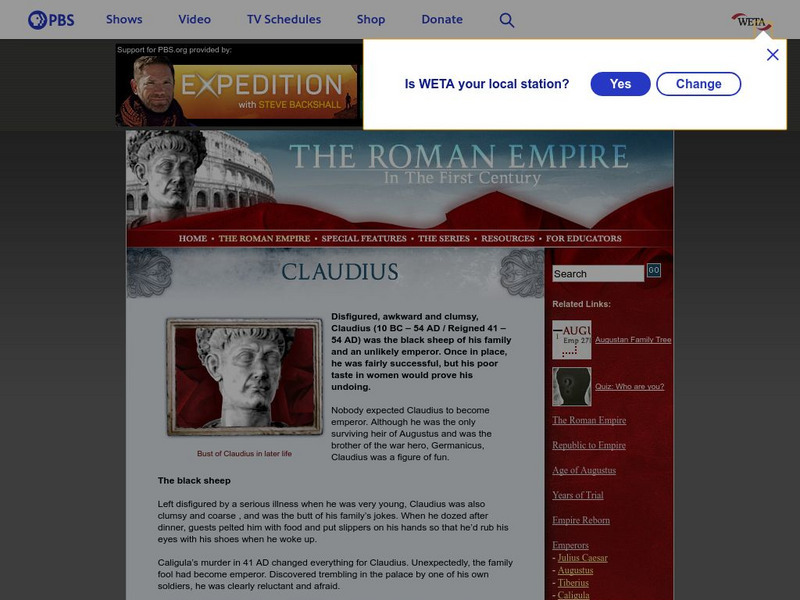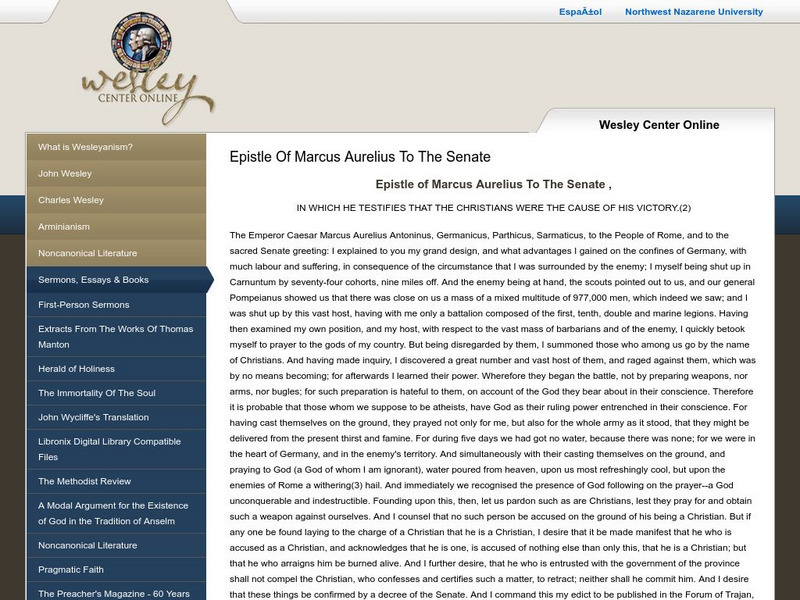Hi, what do you want to do?
Khan Academy
Khan Academy: Portrait of Vespasian
This naturalistic portrait of the emperor Vespasian (reigned 69-79 C.E.) clearly shows the lined complexion of this battle-hardened emperor, and also the curious 'strained expression' which the Roman writer Suetonius said he had at all...
Khan Academy
Khan Academy: Marble Statue of the Emperor Hadrian
The Roman emperor Hadrian is shown here in the himation (a Greek mantle). This unique and well known statue is made up of fragments found in 1861 in the ruins of a temple in the city of Cyrene, in northern Africa.
Loyola University Chicago
De Imperatoribus Romanis: Marcus Cocceius Nerva
This article about the first of the Five Good Emperors looks at the reign of Nerva who brought about positive change after a period of chaos.
PBS
Pbs: Claudius
This site contains an interesting account of the life of Claudius. Includes quotes from ancient and modern historians, as well as a scathing description of his second wife, Agrippina.
Khan Academy
Khan Academy: Forum and Markets of Trajan
Marcus Ulpius Traianus, now commonly referred to as Trajan, reigned as Romess emperor from 98 until 117 C.E. and had a reputation as a good emporer. A massive architectural complex-referred to as the Forum of Trajan was devoted to...
PBS
Pbs: How Art Made the World: Political Art of Augustus
The PBS series, titled "How Art Made the World," explains how a sculptural portrait of Augustus, the famous "Augustus of Prima Porta," was designed to further the political goals of Rome's first emperor. An excellent site for examining...
PBS
Pbs Frontline: The Martyrs
A very nice account which delves into the background of the persecutions of the early Christians under the Romans. The article provides specific historical details as to why and how Christians were being attacked.
Curated OER
Educational Technology Clearinghouse: Maps Etc: Roman Britain, 55 Bc to Ad 449
A map of England (Britannia) under the Roman Empire, from the time of the first invasion by Julius Caesar (55 BC) extending to the invasion of the Saxons (AD 449). The Roman Period of control of Britannia is generally considered AD 43 to...
Other
Wesley Center for Applied Theology: Epistle of Marcus Aurelius
A primary source document written by the great Emperor in which he gives thanks to the Christians for his winning a battle.
Khan Academy
Khan Academy: The Raising of the Widow's Son From the Dead (Magdeburg Panel)
The Magdeburg Panel is one of a group of sixteen ivory plaques depicting a cycle of scenes from the Life of Christ. The original set, numbering forty or fifty, decorated a large piece of church furniture in Magdeburg Cathedral.
Stephen Byrne
History for Kids: Emperor Nero
History for kids provides an overview of the life and controversial leaderhip of the Roman emperor Nero who served in the 1st Century AD.
Khan Academy
Khan Academy: Imperial Fora
A series of public spaces in Rome called fora were built by Roman emperors and contained monumental art and architecture. View examples and read descriptions of Imperial fora built by Julius Caesar and Augustus.
Ducksters
Ducksters: Biography for Kids: Augustus
Kids learn about the biography of Caesar Augustus on this site. Learn about the first emperor of Rome, Octavian was the nephew of Julius Caesar.
Curated OER
Chicago Coin Club: Eight Hundred Years of Roman Coinage
Nearly halfway through this page under the subtitle, "Disintegration of the Monetary System" is a discussion of the monetary collapse and the efforts of subsequent emperors to restore the coinage.
Curated OER
Chicago Coin Club: Eight Hundred Years of Roman Coinage
Nearly halfway through this page under the subtitle, "Disintegration of the Monetary System" is a discussion of the monetary collapse and the efforts of subsequent emperors to restore the coinage.
Curated OER
Chicago Coin Club: Eight Hundred Years of Roman Coinage
Nearly halfway through this page under the subtitle, "Disintegration of the Monetary System" is a discussion of the monetary collapse and the efforts of subsequent emperors to restore the coinage.
Curated OER
Chicago Coin Club: Eight Hundred Years of Roman Coinage
Nearly halfway through this page under the subtitle, "Disintegration of the Monetary System" is a discussion of the monetary collapse and the efforts of subsequent emperors to restore the coinage.
Curated OER
Chicago Coin Club: Eight Hundred Years of Roman Coinage
Nearly halfway through this page under the subtitle, "Disintegration of the Monetary System" is a discussion of the monetary collapse and the efforts of subsequent emperors to restore the coinage.
Curated OER
Chicago Coin Club: Eight Hundred Years of Roman Coinage
Nearly halfway through this page under the subtitle, "Disintegration of the Monetary System" is a discussion of the monetary collapse and the efforts of subsequent emperors to restore the coinage.
Curated OER
Chicago Coin Club: Eight Hundred Years of Roman Coinage
Nearly halfway through this page under the subtitle, "Disintegration of the Monetary System" is a discussion of the monetary collapse and the efforts of subsequent emperors to restore the coinage.
Curated OER
Chicago Coin Club: Eight Hundred Years of Roman Coinage
Nearly halfway through this page under the subtitle, "Disintegration of the Monetary System" is a discussion of the monetary collapse and the efforts of subsequent emperors to restore the coinage.
Curated OER
Chicago Coin Club: Eight Hundred Years of Roman Coinage
Nearly halfway through this page under the subtitle, "Disintegration of the Monetary System" is a discussion of the monetary collapse and the efforts of subsequent emperors to restore the coinage.
Curated OER
Chicago Coin Club: Eight Hundred Years of Roman Coinage
Nearly halfway through this page under the subtitle, "Disintegration of the Monetary System" is a discussion of the monetary collapse and the efforts of subsequent emperors to restore the coinage.
Curated OER
Chicago Coin Club: Eight Hundred Years of Roman Coinage
Nearly halfway through this page under the subtitle, "Disintegration of the Monetary System" is a discussion of the monetary collapse and the efforts of subsequent emperors to restore the coinage.
















